1. Wukong Winged Dragon
160 million years ago, Middle Jurassic
Wukongopterus is a new species of pterosaur whose fossils were discovered in Daohugou, Liaoning.
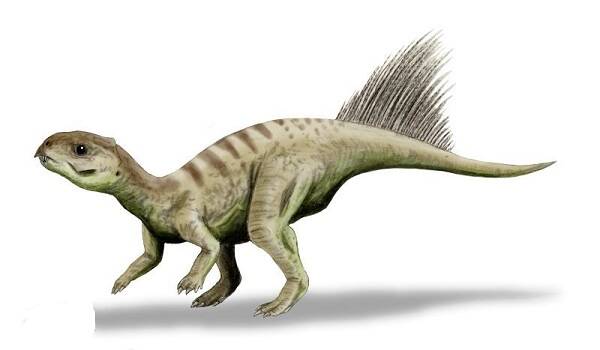
2. Chaoyang Dragon
156 million years ago, Late Jurassic
Chaoyangsaurus (scientific name Chaoyangsaurus) is a ceratopsian dinosaur that lived in China during the Late Jurassic. Chaoyangosaurus belongs to the order Ceratopsida, a type of herbivorous dinosaur with a parrot-like beak. It was mainly distributed in North America and Asia during the Cretaceous. Chaoyangosaurus fossils were first discovered in Chaoyang, Liaoning, my country, hence its name. In fact, Chaoyangosaurus was named only based on an incomplete skull fossil.
3. Tianyuraptor
155 million years ago, Late Jurassic
Tianyuraptor is a small theropod dinosaur that belongs to the microraptor group of dromaeosaurs. Its fossils were discovered in the Liaoning region of China, and its survival era was the Early Cretaceous. There is currently only one species in this genus, the type species Tianyuraptor. Unlike other Microraptors, Tianyuraptor had shorter forelimbs with smaller wishbones.
4. Good at climbing birds and dragons
154 million years ago, Late Jurassic
Scansoriopteryx (meaning "climbing wing") is a maniraptoran dinosaur, a sparrow-sized animal that showed arboreal adaptations (based on the only single specimen found in Liaoning, China). juvenile fossil specimen). The fossil includes an unusual elongated third finger, which may have supported the wing membrane, as well as impressions of feathers. Most researchers believe that Epidendrosaurus was a bird-climber.
5. Taiyulong
136 million - 120 million years ago Early Cretaceous
Caudipteryx (scientific name: Caudipteryx), also known as Caudipteryx, is a genus of small theropod dinosaurs, about the size of a peacock, that lived in the Barremian stage of the Lower Cretaceous (about 124.6 million years ago). Its scientific name means "tail feather". Their bodies are covered with feathers and their overall appearance is very bird-like. Two species of Caudopteryx have been named, namely the type species Caudopteryx tsou's and Caudopteryx dong's.
6. Sinusosaurus
136 million years ago ~ 130 million years ago, Late Jurassic
Sinusosaurus belongs to the Troodontidae family, lived in the early Cretaceous period, and was an omnivorous dinosaur.
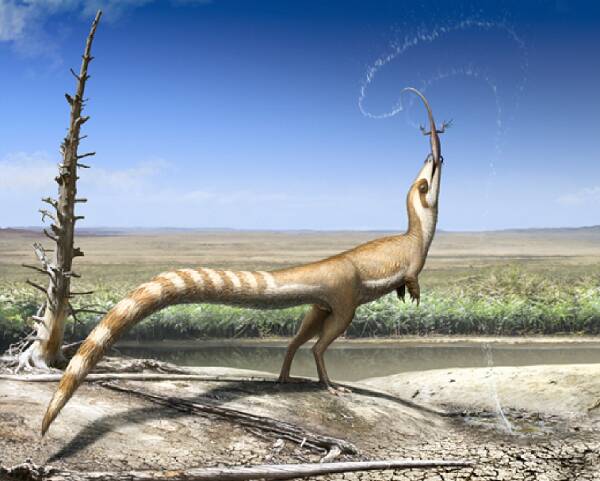
7. Chinese dragon bird
135 million years ago ~ 121 million years ago, Late Jurassic
Sinosauropteryx is a compsognathus found in China. Like most compsognathids, Sinosauropteryx was very petite. According to estimates from the holotype specimen, its body length is about 1 meter. When Sinosauropteryx was first discovered, it was once thought to be very closely related to birds because of its silky feathers. It was considered a key species to solve the origin of birds. However, based on current relevant research, the Compsognathus to which Sinosauropteryx belongs is the most primitive of the maniraptomorphs.
8. Northeast Dragon
133 million years ago ~ 120 million years ago Early Cretaceous
Dongbeititan (English name: Dongbeititan) is a herbivorous dinosaur that lived in the Early Cretaceous 133 million to 120 million years ago.
9. Rehe dragon
130 million years ago ~ 125 million years ago Early Cretaceous
Jeholosaurus (genus name: Jeholosaurus) is a genus of ornithopod dinosaur that lived in China during the early Cretaceous period. Jeholosaurus is a small, primitive ornithopod dinosaur belonging to the group Hypsilodon (considered a paraphyletic group).
10. Jinzhou Dragon
130 million years ago ~ 125 million years ago Early Cretaceous
Jinzhousaurus (genus name: Jinzhousaurus) is a genus of iguanodontosaurs that lived in the Early Cretaceous. Their fossils were discovered in China, where a nearly complete skeleton was discovered. The type species is also the only one known in the 21st century. Jinzhouosaurus was first described by Wang Xiaolin and Xu Xing in 2001. They lived during the Barremian stage, about 125 million years ago. In memory of Mr. Yang Zhongjian, the father of vertebrate paleontology in my country and the first person to study dinosaurs in China.
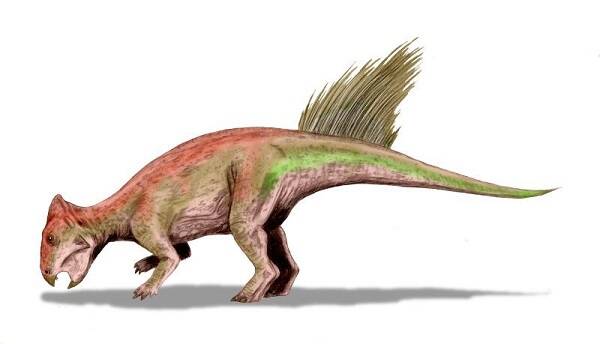
11. Liaoning horned dragon
130 million years ago ~ 125 million years ago Early Cretaceous
Liaoningceratops is the earliest known neoceratopsian in the world. Liaoningceratops lived in the Early Cretaceous about 130 million years ago. It was similar in size to a larger dog. It was an animal that walked on four legs and fed on plants. Unlike Triceratops, which developed a long neck shield, Liaoningceratops had a short neck shield and weak zygomatic horns. Paleontologists also discovered that a series of important features of ceratopsians, such as their ostentatious neck shields and specialized chewing structures, evolved slowly.
12. Meilong
130 million years ago ~ 125 million years ago Early Cretaceous
Meilong is a small theropod dinosaur found in China, with a body length of only about 53 centimeters. Fossil specimens of Mesaurus preserve its sleeping posture, which also shows that many behavioral characteristics of modern birds have already appeared in non-avian dinosaurs.
13. Near bird
130 million years ago, Early Cretaceous
Anchiornis is a small theropod dinosaur found in China, with a body length of about 34 cm and a weight of about 0.1 kg. Early taxonomic work considered Anchiornis to be a troodontid, but recent phylogenetic analysis of coelurosaurs supports that it is a basal member of Ornithosaurus. The collection of Anchiornis specimens is very large, and many of them have beautifully preserved feather impressions. These specimens support a number of significant scientific research results, helping evolutionary biologists decipher the origins of birds.
14. Dilong
130 million years ago, Early Cretaceous
Dilong is a small carnivorous dinosaur discovered in China. It is about 2 meters long and lived in the Early Cretaceous. Its phylogenetic position is between the protoceratopsians and the more advanced tyrannosaurs. There is only one kind of emperor dragon, which is the strange emperor dragon. Although Dilong is petite, it already has some characteristics that are only found in advanced tyrannosaurs, such as relatively short forelimbs. In addition, Dilong also has fibrous feathers preserved around its body.
15. Slenderraptor
130 million years ago ~ 125 million years ago Early Cretaceous
Slenderraptor is a small theropod dinosaur discovered in Beipiao, Liaoning Province. It is about 90 centimeters long and belongs to the Microraptor class among dromaeosaurs. The knuckle bones of Slenderraptor have greater curvature than the hand knuckle bones of many large ground-dwelling dinosaurs, so it may have been an arboreal dinosaur. There is currently only one specimen of Ellipraptor, and because no epidermal derivatives have been preserved, paleontologists are unable to determine whether Ellipraptor could possess metatarsal feathers and perform four-wing gliding like Microraptor.
16. Red Mountain Dragon
130 million years ago ~ 125 million years ago Early Cretaceous
Hongshanosaurus (scientific name: Hongshanosaurus) is a psittacosaurid dinosaur from East Asia during the Lower Cretaceous. Although there are only two skull fossils, comparison with its close relatives revealed that it was a bipedal herbivorous dinosaur with beaks at the front of its upper and lower jaws. It is one of the complete fossils discovered in the Jehol Formation in Liaoning Province, China.
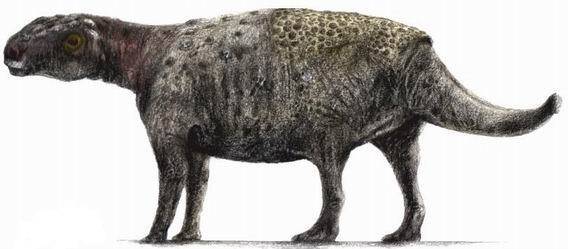
17. Liaoning Dragon
130 million years ago ~ 125 million years ago Early Cretaceous
Liaoningosaurus (scientific name: Liaoningosaurus) is an unusual genus of ankylosaurid dinosaur from the Lower Cretaceous.
18. Divine Dragon
130 million years ago ~ 125 million years ago Early Cretaceous
Shenzhousaurus (genus name: Shenzhousaurus) is a primitive ornithomimus dinosaur that lived in China during the Barremian stage of the Lower Cretaceous. The holotype specimen was found in the fluvial alluvium at the bottom of the Yixian Formation in Beipiao City, Liaoning Province. The specimen consists of a partial skeleton resting on a sandstone block. The specimen's head is positioned above the torso, a standard death posture.
19. Chinese ornate feathered dragon
130 million years ago ~ 125 million years ago Early Cretaceous
Sinoptera is a kind of compsognathus found in Liaoning, China. There is currently only one species in this genus, the giant Sinoptera. Unlike other small-bodied compsognathids, Sinoptera has a larger body size and is the largest known compsognathus. The holotype specimen is about 2.4 meters long, and another classified specimen may be even larger, and there is evidence that this large compsognathus hunted dromaeosaurs.
20. Chinese dragon hunting
130 million years ago ~ 125 million years ago Early Cretaceous
Chinese hunting dragon is less than 1 meter longMi is definitely a "little guy" in the dinosaur family, but because its forelimbs have evolved into wings that can be extended to both sides like a bird, it has transitional characteristics from dinosaurs to birds, making it a " Another major piece of evidence for the theory that birds originated from dinosaurs.
21. Tianyulong
130 million years ago, Early Cretaceous
Tianyulong is an ornithischian heterodontosaurid dinosaur. The fossil was discovered in Jianchang County, Liaoning Province, China. The geological age belongs to the Jehol Group of the early Cretaceous period. In the Tianyulong fossil, there are feather-like indentations on the neck, back, and tail. These feather-like structures are thin tubes without branches and are dermal derivatives; their structure is quite similar to the primitive feathers of known feathered theropod dinosaurs. Scientists speculate that these dinosaurs, which are quite distantly related to each other, had similar
22. Yixian Dragon
130 million years ago ~ 125 million years ago Early Cretaceous
Yixianosaurus (genus name Yixianosaurus) means "Yixian lizard". It is a maniraptoran dinosaur that lived in China during the Aptian stage of the Early Cretaceous, about 122 million years ago. Only one pair of arms with fossilized feathers has been found on Yixianlong. The exact position of Yixianosaurus among the maniraptorosaurs has not yet been determined, but it may belong to the family Anchiornis.
23. Archeopteryx
128 million years ago ~ 110 million years ago, Early Cretaceous
Protarchaeopteryx (genus name: Protarchaeopteryx) is a turkey-sized feathered dinosaur discovered in China. The primitive Archeopteryx had well-preserved feathers on its thick and short tail; their hands were slender with three claws and carpal bones. The discovery of Archeopteryx has greater significance in the study of the origin of birds, because it has real feathers and is evolutionarily closer to birds than Sinosauropteryx. But it is more beautiful than the famous Archaeopteryx produced in Germany.
24. Tyrannosaurus Raptor
125 million years ago, Early Cretaceous
There is currently only one species in the genus Tyrannosaurus, the type species Tyrannosaurus kryptonii, whose fossils were donated to the University of Chicago for research by Henry Christian. Serino and others determined the origin of this specimen as the Yixian Formation in China based on standard fossils in the surrounding rocks. However, recent research has pointed out that the origin of this specimen may be the Erlian Formation in Mongolia, and the relatively new Tyrannosaurus rex Phylogenetic research papers also use this date. Tyrannosaurus is a small, strange-looking theropod dinosaur that, as an adult,
25. Microraptor
124 million years ago, Early Cretaceous
Microraptor is a small theropod dinosaur discovered in Liaoning, China. It belongs to the dromaeosaurs in the class Featherraptor and has a very close genetic relationship with birds. Currently, there are three species in this genus, including the type species Microraptor Zhao, the subspecies Microraptor Gu and Microraptor Hanqing. Among them, Microraptor zhao may be one of the smallest theropod dinosaurs currently known. The collection of Microraptor fossils is also very large, including about 300 unpublished specimens in addition to officially published specimens.
26. Beipiao Dragon
124 million years ago, Early Cretaceous
Beipiaoosaurus is a feathered carnivorous dinosaur. From the skin traces of the type specimen, it is shown that the body of Beipiaoosaurus was covered with down-like feathers, just like Sinosaurus, but the feathers of Beipiaoosaurus were longer and vertical to the arms. Xu Xing and others believe that the downy feathers of Beipiaoosaurus mean that they are an intermediate species between Sinosauropteryx and higher birds (ornithopterygoids).
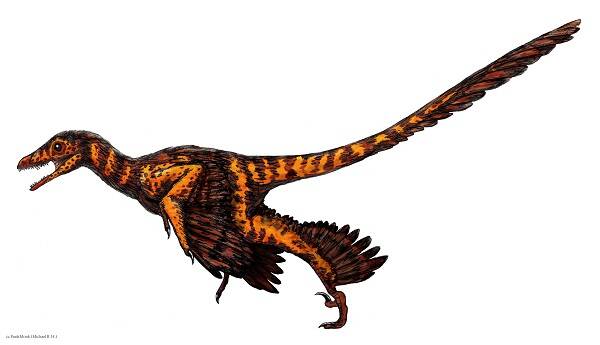
27. Chinese bird dragon
124 million years ago, Early Cretaceous
Sinornithosaurus is a small dromaeosaur found in Liaoning, China. Like Microraptor, it belongs to the Microraptor class of dromaeosaurs, and is slightly larger than Microraptor. There are two species in the genus Sinornithosaurus, the type species Sinornithosaurus millennium and the classified species Sinornithosaurus hao's. The fossils of Sinornithosaurus preserve an almost complete skull, providing many anatomical details. As a relatively primitive dromaeosaur, the skull of Sinornithosaurus is very similar to Archaeopteryx and other early birds.
28. Yulong
120 million years ago, Early Cretaceous
The scientific name of Yulong (genus name Cryptovolans) comes from the Latin "Cypto-" (meaning "hidden, hidden") and "volans-" (meaning "flying"), which means "hidden flyer". The type species of Yutosaurus was named CryPtovolans pauli, and the species name was in honor of the paleontologist Gregory S. Paul.
29. Dalian bird
120 million years ago, Early Cretaceous
Dalianraptor (Dalianraptor, whose scientific name means "thief of Dalian") is a genus of primitive birds that lived in prehistoric China. It survived about 125 million years ago in the Early Cretaceous. The Dalian bird is about 80 centimeters long and was found in rock formations of the Jiufotang Formation in western Liaoning Province.
30. Like tail feather dragon
120 million years ago, Early Cretaceous
Similicaudipteryx (scientific name means "similar to tail feather") is a theropod dinosaur belonging to the family Similicaudipteryx. The type species is S. yixianensis. Its fossils were found in the Jiufotang Formation and can be traced back to the Albian to Aptian stages of the Early Cretaceous, about 112-120 million years ago.
31. Beipiaognathosaurus
120 million years ago, Early Cretaceous
Beipiaognathus is a small dinosaur that lived in the Early Cretaceous 120 million years ago.
32. Psittacosaurus
119 million years ~ 97.5 million years ago Early Cretaceous
Psittacosaurus, also translated as Psittacosaurus, means "parrot lizard" in Greek. It is a genus of Psittacosaurus in the order Psittacosaurus. It lived in Asia during the Early Cretaceous, about 123.2 million years ago to 110 million years ago. years ago. Psittacosaurus, Protoceratops, Triceratops and other dinosaurs all have a parrot-like hooked beak. Scientists infer from its body shape and age of survival that Psittacosaurus may be the ancestor of most ceratopsian dinosaurs. .
33. Krysosaurus
100 million to 90 million years ago, Late Cretaceous
Crichtonsaurus (English name: Crichtonsaurus) is dedicated to Michael Crichton, the famous science fiction writer and author of the movie "Jurassic Park"; the species name Crichtonsaurus is dedicated to his significant contribution to the study of vertebrate paleontology in China. Swedish paleontologist Bu Lin.
34. Double Temple Dragon
100 million years ~ 94 million years ago, Early Cretaceous
Shuangmiaosaurus (genus name: Shuangmiaosaurus) is a genus of iguanodontosaurs that lived in China during the Late Cretaceous.
35. Northern Dragon
86 million - 83 million years ago Late Cretaceous
Borealosaurus (scientific name: Borealosaurus) belongs to the phylum Chordata, class Sauriformes, order Sauroptera, Saltasauridae, and genus Borealosaurus.
animal tags:
We created this article in conjunction with AI technology, then made sure it was fact-checked and edited by a Animals Top editor.